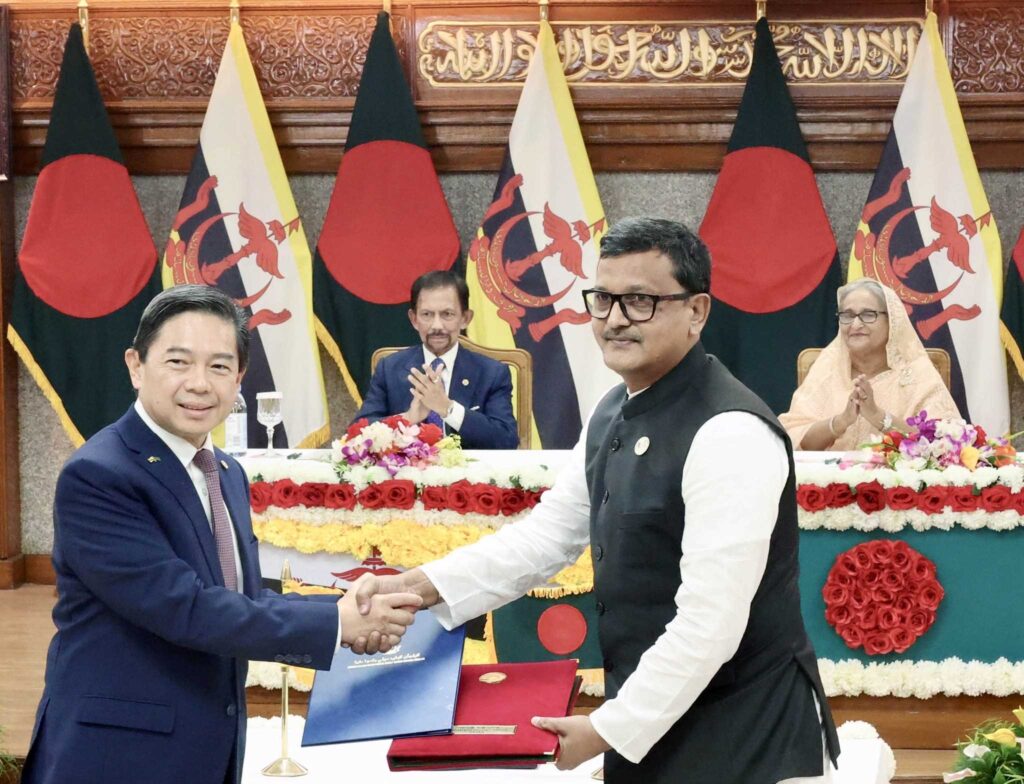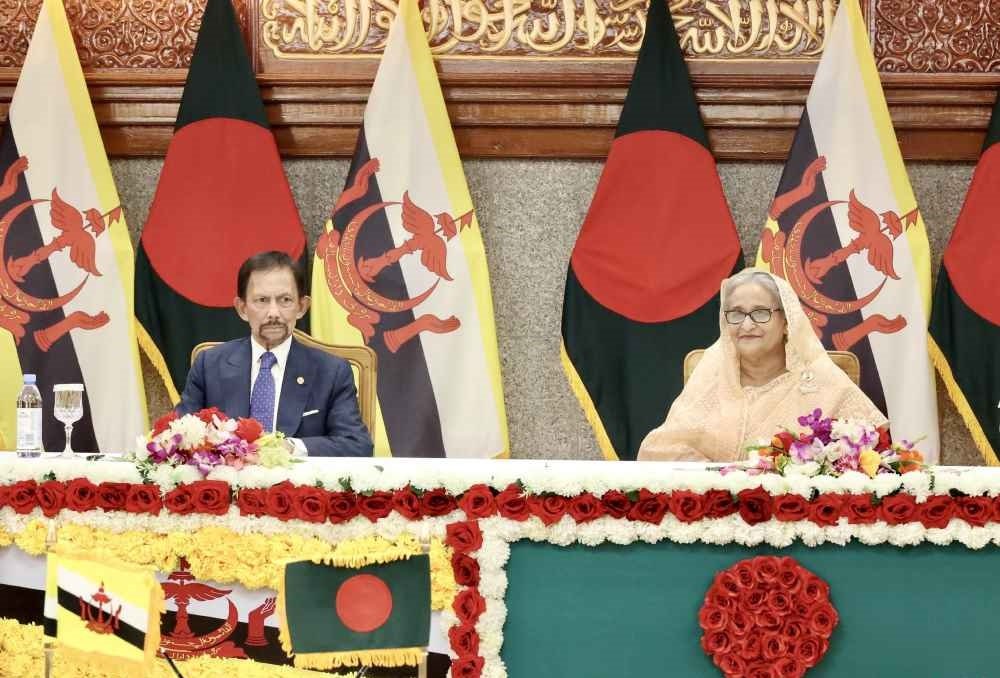As Brunei Sultan left Bangladesh wrapping up a three-day state visit on Monday, the two brotherly countries took their bilateral relations to a new level by signing four instruments Sunday on collaboration in the sectors of energy, aviation, personnel recruiting, and recognition of credentials for seafarers from both nations.
The four signed documents
In light of the rise in fuel prices and supply chain problems caused by the Russia-Ukraine war, the latest development takes place as Bangladesh searches for other energy sources from supply countries like Brunei. However, one of the instruments is a contract, while the remaining three are memorandums of understanding (MoUs). The sole contract relates to aviation services.
You can also read: UK politics plunges in further turmoil with Truss’ tax U-turn
The three MoUs are: “MoU on the Employment and Recruitment of Bangladeshi Workers,” “MoU on the Field of Cooperation in the Supply of Liquefied Natural Gas (LNG) and other Petroleum Products;” and “MoU on the Recognition of Certificate Issued under the Provisions of the International Convention on Standards of Training, Certification and Watchkeeping for Seafarers, 1978 as amended.”

Signing of the instruments
The Brunei Darussalam delegation was led by the visiting Sultan Haji Hassanal Bolkiah Mu’izzaddin Waddaulah, while Prime Minister Sheikh Hasina represented the Bangladesh side.
The agreement on air services was signed by Bangladesh’s State Minister for Civil Aviation and Tourism, Md. Mahbub Ali, and Brunei’s Minister of Finance and Economy, Dr. Amin Abdullah.
The MoU on Employment and Recruitment of Bangladeshi Workers was signed by Brunei Minister of Home Affairs Ahmaddin Bin Haji Abdur Rahman and Bangladeshi Minister of Expatriates’ Welfare and Overseas Employment Imran Ahmad.
The MoU in the area of cooperation in the delivery of LNG and other petroleum products was signed by Brunei Minister Dr. Amin Abdullah and Bangladesh State Minister for Power, Energy, and Mineral Resources Nasrul Hamid.
Khaled Mahmud Chowdhury, the state minister for shipping in Bangladesh, and Dr. Amin Abdullah, the minister of Brunei, signed an agreement on the recognition of certificates issued in accordance with the International Convention on Standards of Training, Certification, and Watchkeeping for Seafarers.
The agreements were formally signed on Sunday at the Prime Minister’s Office in Dhaka following constructive bilateral discussions between the representatives of Bangladesh and Brunei Darussalam. The Sultan of Brunei, Haji Hassanal Balkiah, and the Prime Minister, Sheikh Hasina, witnessed the signing of these agreements and memorandums of understanding (MoUs).
Currently, Brunei employs 20–25 thousand employees from Bangladesh. In Brunei, the majority of the labor force is devoted to infrastructure construction. Brunei recognizes the contribution of foreign workers from Bangladesh to its economic growth. Both nations have agreed to talk about hiring more people from Bangladesh in fields where Brunei needs professionals and skilled labor. Both Bangladesh and Brunei have committed to conducting the hiring procedure in an ethical, systematic, and transparent manner.
When discussing the signing of an MOU in the health sector, Bangladesh and Brunei took into account the country’s expanding health sector capacity and the latter’s modern and advanced health infrastructure. This Memorandum of Understanding will be about things that are important to both sides, like training and hiring professionals in the health sector, the specialized services sector, and the pharmaceutical manufacturing industry.
Potential sectors of further collaboration
The two nations have selected trade and investment as key areas for enhancing bilateral cooperation, according to the joint declaration. The amount of trade between the two countries is much lower than it could be. As a result, both nations have said they are interested in boosting commerce. The two parties decided to intensify their collaboration in the halal trade sector.
Bangladesh has urged Brunei to make investments and take use of the Special Economic Zone’s advantages. In light of this suggestion, Brunei has indicated a desire to talk about investment collaboration in areas of shared interest. On the other side, Brunei has proposed that Bangladesh make investments in the food, agriculture, and fishing industries by taking advantage of the advantages of that nation’s economic diversification initiative.
“We have ongoing development projects to facilitate investment. There are deep seaports, 100 Special Economic Zones, Hi-Tech parks, tourism parks, Nuclear Power plant, Metro Rail, LNG terminal and construction of road and rail on bringing the whole country under a common network. So, compared to before, our story has changed dramatically, and Brunei can now choose Bangladesh as their upcoming trade and investment destination,” said Md. Jashim Uddin, President of the Federation of Bangladesh Chambers of Commerce and Industry (FBCCI) in a statement.
In order to facilitate the transition to the 4IR, the FBCCI chief continued, “We anticipate the potential for expanding cooperation in trade and investment with a focus on development and innovation, food processing, ICT, plastic, petrochemical, shipbuilding, tourism, infrastructure development, petroleum and energy, and knowledge transfer.
Commerce Minister Tipu Munshi, urged the Brunei Finance Minister to drop the unfair requirement that Bangladeshi immigrant employees deposit $1600 while Malaysian workers just have to pay $500.
The minister highlighted some of the key advantages offered by Bangladesh’s foreign investment laws. He pointed out that in addition to the enormous domestic market, investing in Bangladesh will also give one access to the Indian and Chinese markets, where the majority of goods created in Bangladesh are allowed duty-free.
Beneficial bilateral trade
Foreign Minister AK Abdul Momen declared that the Sultan of Brunei’s visit represented the start of a new chapter in bilateral ties during a press conference at the Prime Minister’s Office following the summit. The Foreign Minister mentioned that the Prime Minister had lengthy conversations with the Sultan of Brunei.
“During those talks, the Prime Minister proposed to increase Brunei’s trade and investment with Bangladesh. The foreign ministers of the two nations will collaborate on this. In addition, a joint consultative commission can be established to find a solution,” he added.
According to the foreign minister, Bangladesh has established 100 Special Economic Zones. The Sultan of Brunei has expressed interest in hiring Bangladeshi specialists in halal meat, information technology, agriculture, and fisheries.
Brunei Sultan’s Dhaka visit
Sultan Haji Hassanal Bolkiah began a three-day state visit in Dhaka on October 15. On the invitation of PM Sheikh Hasina and President Abdul Hamid he visited Dhaka for the first time.
He was given flowers by President Abdul Hamid to welcome him to Bangladesh.
At Hazrat Shahjalal International Airport, he was greeted on the red carpet. From the airport, the Sultan of Brunei traveled to the Savar National Memorial to pay respects to the valiant martyrs of Bangladesh’s battle for independence.
Later, he went to Dhanmondi 32 and paid his respects to the grave of Bangabandhu Sheikh Mujibur Rahman. At night, he went to Bangabhaban for a dinner hosted by President Abdul Hamid.
On Monday after the visit, he left Dhaka. In 2019, HPM Sheikh Hasina traveled to Brunei.


